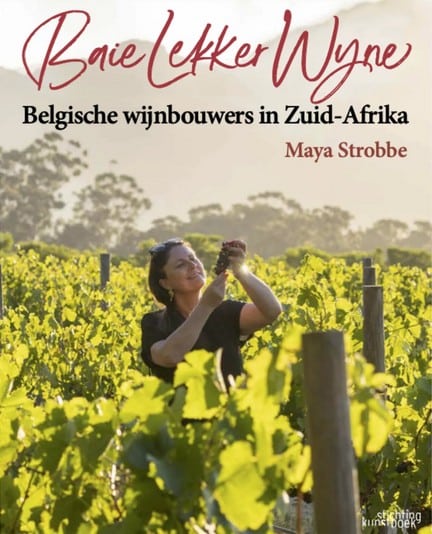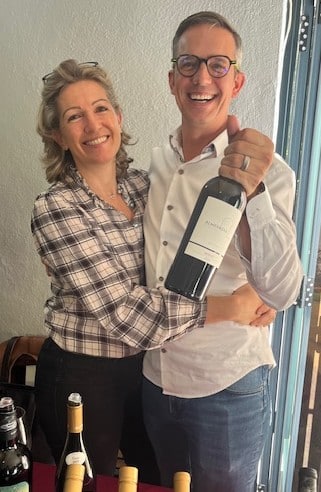Tim James: The surprising scale of Belgium’s presence in the Cape winelands
By Tim James, 25 August 2025

1
 Is Belgium the country with the largest number of expatriates having wineries in South Africa? I think it could well be, though it’s come as a bit of a surprise to me to realise just how many there are. There’s even a book about them (and an associated website), by Maya Strobbe – in Dutch, but most locals could understand its title pretty easily: Baie Lekker Wyne. Maya gives a total of 18, but a few of those are, well, arguably a bit iffy as inclusions. Of the remainder, some are very well known, even eminent, producers and their Belgian connections also well known. A few less so on both counts.
Is Belgium the country with the largest number of expatriates having wineries in South Africa? I think it could well be, though it’s come as a bit of a surprise to me to realise just how many there are. There’s even a book about them (and an associated website), by Maya Strobbe – in Dutch, but most locals could understand its title pretty easily: Baie Lekker Wyne. Maya gives a total of 18, but a few of those are, well, arguably a bit iffy as inclusions. Of the remainder, some are very well known, even eminent, producers and their Belgian connections also well known. A few less so on both counts.
Try this list, in alphabetical order: Almenkerk, Almeera, Bushmanspad (with Norwegian partners), Colmant, Dunstone, Eerste Hoop, Hasher ( think the newest addition), Mooi Bly, Olivedale, Redamancy, Spioenkop, Tempel, and Wolvenhoek.
Seven of these last week showed their wines at the first edition of the Belgian Barrels Trade Festival, organised by the local Belgian Chamber of Commerce, together with a few importers of Belgian beer and spirits. Also on show, puzzlingly, was the now Austrian company Riedel, who were selling glasses and presented some formal tastings in them. Most unfortunately, though, Riedel were not supplying glasses for the visitors to taste from, so we had to do our best with some horrid little glasses: this bit of organisational meanness didn’t do the wines any favours.
The atmosphere was festive enough (ie, rather noisy), so not entirely conducive to attempting dour tasting diligence even despite the glasses. But I did my best and it was a pleasure to revisit some old wine friends and make some new ones.

Natalie and Joris van Almenkerk.
In terms of a Belgian presence in the Cape, the Belgian-Dutch partnership of Joris and Natalie van Almenkerk are probably the pioneers, having established their winery on a former Elgin apple farm in 2004 – although their first bottling was 2009, so they were pipped at that post by Colmant (in 2006; they weren’t at this event). All the Almenkerk wines are very good (the Merlot a touch too ripely merlotish for my tastes), and I particularly enjoyed the about-to-be released Chardonnay 2023, quite intense with a grippy phenolic edge; and the top-of-the-range red blend, Flemish Masters 2020 – flavourful, balanced and softly textured, with smooth tannins and some concentration.
Spioenkop is another well-established Elgin estate, but it suffered a setback when Koen Roose had a bad car accident about three years back. He’s progressing well, and releasing wines with some maturity on them, including the three showing here: a gorgeous 1900 Chenin Blanc 2020, a sweetly gripping Pinot Noir 2021, and a fine Pinotage 2021, with a full tannic structure in its rather elegant balance.
Tempel is the other one of the properties showing that I have known well – I visited the pretty Paarl property in late 2019, in the early years of its new ownership. In fact I suppose we could call this a rare Belgian-Latvian partnership, given the origins of Tatjana Holkina, the wife of Tom Heeremans. The wines have delightful Dutch-Afrikaans names and are all appealing, nicely dry, and good – also with a few years maturity on release, which is a bonus for the consumer. This time I particularly enjoyed the Skemerdans Grenache (the 2021, from Piekernierskloof and home grapes), very charming but with a crunchy, slightly herbal bite), and the impressive (as always) Tydsaam Tempranillo 2021.
The rest of the wineries present were largely new to me. From Eerste Hoop in Bot Rivier, I sampled two 2022s – a Chardonnay that is tasty and rich and a touch sweet, and the Lodewijkx blend of chenin, chardonnay and a little viognier, also quite big and ripe but rather more refined. Ameera is a property on the Annadale Road in Stellenbosch, the wines made at Somerbosch I believe. I admired the Envie (pronounce it Frenchly!) Sauvignon Blanc 2024, succulent and showy and at a very reasonable price – but somehow I neglected to return to the stand when I was tasting reds, which is a pity.
Redamancy means something like “reciprocal love”, and is the Devon Valley-based brand of Marc van Uylvanck and his South African wife Antoinette Rapitsi (their beloved dogs not to be forgotten). They specialise in Vermaaklikheid chardonnay and Stellenbosch cabernet sauvignon, with a few different labels of each. The 2024 Chardonnay, with well-calculated new oak was the subtlest of the three chards I tried, finely balanced, fresh and juicy. Cabernet Sauvignon 2022 managed to combine a big, ripe, youthfully tannic richness with a light-feelng freshness.
Wolvenhoek Vineyards is also a newish label, the farm in Wellington’s Groenland ward acquired by the Sax family in 2018. The wind “howls like a wolf through the mountains”, hence the name. There are a lot of old vineyards producing some interesting and really good wines, across three ranges. They were seven of them on offer. The old-oaked Impisi Old Vine Chenin Blanc 2023 was the most impressive – light-feeling and elegant yet with some power. Of the reds, the Takaya blend of shiraz with cab stood out, well structured and serious, sweet-fruited but less ripely obvious than the monovarietal reds. I’d say definitely a producer to keep an eye on.
The Cape winelands are more interesting these days, with the foreigners who have come to share them with the locals. I suspect a lot of the wines made by Belgians here go back to the old country, and that’s a good thing too.
- Tim James is one of South Africa’s leading wine commentators, contributing to various local and international wine publications. His book Wines of South Africa – Tradition and Revolution appeared in 2013.







GillesP | 25 August 2025
It’s a good thing to see foreigners investing in the country whether it be wine or something else, given how our government and laws makes it difficult, you need some serious courage to navigate through these obstacles. Obviously for the big groups and wealthy foreigners, the price of the land makes it still VERY attractive in comparison to Europe winelands.